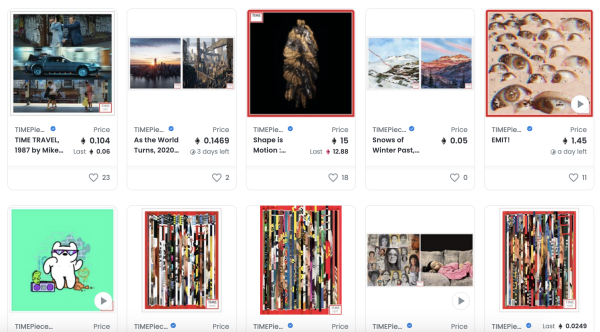
One publisher is streets ahead of the competition when it comes to making money from NFTs: US current affairs title Time. President Keith Grossman told Press Gazette’s Future of Media Explained podcast why he is so focused on the new revenue stream and what his plans are for the future.
The Wall Street Journal last month reported that sales of non-fungible tokens were “flatlining” and asked the question: “Is this the beginning of the end of NFTs?”
Keith Grossman, the president of Time – arguably the media’s NFT trailblazer – insists his company has experienced no such slowdown.
“You still continue to see sales in Timepieces, and people entering into the community,” he told Press Gazette’s podcast, Future of Media Explained. “Because they know that we have stability and that we’re committed to [this].”
Founded 99 years ago, Time is perhaps an unlikely champion for the NFT and Web3 worlds. But, as reported by Press Gazette in April, it claims to have generated revenues of more than $10m since initiating its first NFT sale in March 2021 – far above the totals of any other traditional publisher, as the table below illustrates.
For the fourth episode of Future of Media Explained, Press Gazette interviewed Grossman (pictured above, at right) to find out more about how Time hit upon NFTs as a revenue stream and how he views the future of the technology.
Quick guide: blockchain, NFTs and Web3
An NFT, or non-fungible token, is a certificate of ownership associated with a digital object, for example a picture or a video.
NFTs differ from conventional certificates because, like cryptocurrencies such as Bitcoin, their ownership is recorded in a blockchain – a public, digital ledger that is effectively impossible to forge or manipulate.
The proliferation of technologies based on blockchains has prompted some tech evangelists to pronounce the coming of “Web3”: an envisioned next evolution of the internet underpinned by the transparent ledgers.
Why ‘dorky’ Grossman embraced NFTs for Time
Grossman, who formerly held executive positions at Wired and Bloomberg, has been president of Time, working alongside editor-in-chief and chief executive Edward Felsenthal, since 2019.
Salesforce founder Marc Benioff and his wife Lynne had purchased Time from Meredith Corporation in September 2018 and shortly thereafter brought in Grossman.
“I asked them both when [they] bought it: what is it that you want with having this asset?
“And both of them said to me independently that they didn't like the state of news media. They felt that it was being bifurcated in both directions, the extremes, and they wanted to preserve the objective, centrist red border that Time has had for the past hundred years – for the next hundred years.”
In 2020, as large parts of the world were going through lockdowns and enforced isolation, Grossman said he started to recognise the value of one’s “online persona, or my online identity, just as much as my in-real-life identity”.
He identified NFTs as future infrastructure for digital personas. “In my mind, it connected that if one values their physical identity as much as they value their digital identity, then by extension one would value physical assets as much as they would value digital assets.”
Grossman also believes that NFTs and Web3 are benefiting from consumers’ growing interest in privacy. “In Web One, as it relates to privacy, nobody really owns anything. And in Web 2 they - they being the platforms - own you. Like, I'm on Instagram or Facebook or Twitter, and in return for being an online renter, the platforms extract all of my data. In Web3, you own you.”
Grossman predicts this will have major ramifications for business.
“A lot of media companies are going to have to start to think about: ‘How are we going to engage with our customers in a world where we might not have all of the data dependencies that we built our brands around?’”
Ultimately, Grossman adds, “the reason we’re in crypto and Web3 is really because, if you look at my background, I'm just a dorky guy who likes technology and innovation and business and art”.
NFTs: Time for art
Upon visiting Time’s storefront on NFT sales platform Opensea, a casual viewer might be confused about what the objects on sale have to do with the brand most famous for its “Person of the Year” covers.
Some of the Time NFTs have a visual link to the magazine, bearing its famous red border or harkening to past covers.
But many appear to simply be works of fine art - or even music - with no connection to Time beyond a small logo.

A screenshot of Time's NFT storefront on Opensea
The Time NFT revenue strategy
Time's NFT revenue engine is, in effect, a digital gallery space. Its Opensea store brings together a group of approximately 90 artists, photographers and even musicians: a recent partner is renowned R&B and hip-hop producer Timbaland.
Most news publishers dabbling in NFTs simply turn their own visual property - for example their photography archive or old front pages - into digital tokens. How did Time arrive at its NFT strategy?
Grossman explained that although Time started out selling conventional NFTs of its covers – NFTs he calls “1/1s” because each is one of a kind – part of the potential he saw in blockchain was in what it could do for artists.
When sold - both for the first time and in secondary sales - most NFTs automatically send a portion of the proceeds to the artist. This differs from conventional secondary art sales, from which artists rarely benefit financially.
“And so in September [2021] when we decided we were going to launch Timepieces as Time’s Web3 community initiative, we had not just our belief in what this technology could do, but also belief in how the relationship should be structured for our organisation moving into Web3.
“And one of the things that we really wanted to focus on was: if there's a new way in which creatives can be monetising their work, we should empower that.
“The first thing we did was we said: [for] anyone who partners with Time on Timepieces, the first 1% of primary and secondary sales will go to charity…
“And then of the remaining 99% of primary and secondary sales, we split it evenly with the artists right down the middle. So if it's us and another artist, it's 50/50. And if it's two other artists and us, it's 33/33/33. And that has been not just for primary, but also for secondary sales. And that term goes forever. It’s in perpetuity.”
Grossman declined to give Press Gazette a precise figure for how much revenue Time had generated with its NFT sales, only confirming the earlier figure of "at least" $10m.
But he did disclose that the Timepieces community had “donated over, I want to say, $600,000 to organisations that could support free democratic presses” using that first percent of sales - which might be taken to imply that Time’s Timepiece sales have grossed at least $59.4m (£48m) to be split between the magazine and its partner artists.
That didn't mean all was rosy, though: Grossman told Press Gazette that overall, Time remained unprofitable.
“As we pulled out of Meredith a few years ago, this was a brand that was - and I've said this publicly - neglected for nearly a decade".
NFTs for publishers: ‘You don’t have to rush in. But pay attention’
So what would Grossman tell other publishers who might be pondering a lurch into NFTs? Has all the money been made already?
“I would say: if the goal of getting into Web3 is to make money - step back and think about what you want your goal to be.
“But I would give that same advice to anyone if their goal is to make money in anything. Step back and think: what is it that you really want to achieve?
“We're at the very earliest stages of this evolution that's taking place. In my mind, it's a 20-year evolution - or revolution - toward online ownership versus being online renters.
“It's an evolution and a revolution in the way in which privacy can be controlled by the individual at the personal information level.
“It's an evolution in the way in which consumers are going to interact with each other and with brands…
“NFTs are not a religion. They're not political. Ultimately, they're just a technology that allows you to validate ownership online. So I wouldn't just recommend that publishers pay attention to this: I would recommend that any industry that lacks transparency pay attention to this".
He listed among those industries medicine, banking and finance, as well as any business using loyalty schemes or membership programmes.
“I would ask any brand who is considering this moment and saying ‘no’ to make sure that they're just paying attention to the moment.
“You don't have to rush in. There's no need. But pay attention to what's happening - because these are larger trends that are taking place that are huge signals of a tectonic consumer shift.”
For additional discussions and insights, listen to the condensed interview with Grossman on the Time NFT strategy.
Press Gazette is hosting the Future of Media Technology Conference. For more information, visit NSMG.live
Picture: Time
Email pged@pressgazette.co.uk to point out mistakes, provide story tips or send in a letter for publication on our "Letters Page" blog
